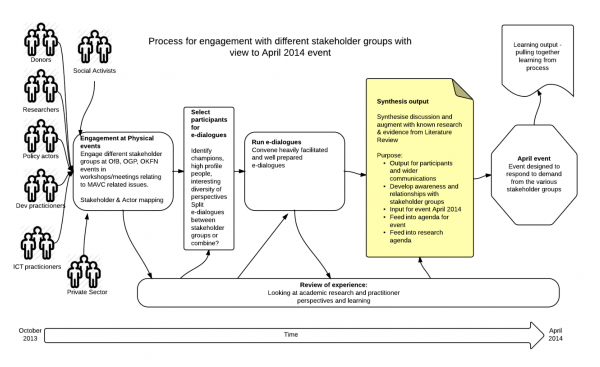All over the world, citizens have long claimed their rights and demanded that governments address their needs. This is a constant struggle: many citizens’ rights remain unrealised and many needs unmet. For governments too, it’s sometimes a struggle to ‘hear’ what citizens are saying.
Making All Voices Count is about finding ways to make it easier and less costly for citizens to engage, and for governments to become responsive to citizens’ voices.
Rosie McGee, Research and Evidence Component Coordinator of Making All Voices Count explains:
Over the last 30 years there have been many ways of framing this challenge. Some frame it as a technical issue, others more as a political issue. Today, there is a broad consensus surrounding the barriers which hamper this relationship between citizens and government.
These are:
- Citizens lack meaningful opportunities to engage with governments
- Citizens lack the necessary incentives to express their feedback on government performance
- Governments lack incentives to respond to citizen input
- Governments lack ability to translate citizen feedback into action
Making All Voices Count recognises that these are highly complex challenges. A serious approach to addressing them must consider the following factors:
- Citizen-state relations are deeply embedded in political processes. Broken feedback loops may be a function of capacity constraints, but may also happen through a lack of will, vested interests, and misalignment of expectations between ‘rulers’ and ‘the ruled’.
- Citizens are diverse. They’re differentiated by gender, ethnicity, socio-economic profile, and educational levels among others, which all affect their incentives and agency and their likelihood of engaging successfully with governments. Disproportionately affected are those groups that are marginalised in society, between men and women, rural and urban populations, and ‘normal’ citizens and those who fall outside prevailing norms on religion, sexual orientation and culture.
- Citizen-state relationships are complex, characterised by multiple sets of accountabilities and interests, rather than one simple, linear accountability relationship. Citizens are at the same time users of services, consumers of goods and products, and citizens. A programme or intervention can engage with them as ‘users and choosers, or as ‘makers and shakers’ of the governance systems of the 21st century.
- People – whether they’re citizens or government actors – will only take up and use approaches which can be easily embedded in their lived daily realities. So the take-up of initiatives or innovations is crucially determined by non-technical factors as well as technical determinants of innovation impact, and technological solutions will never be complete or effective without attention to these non-technical factors.
Making All Voices Count’s Research & Evidence component sets out to:
- produce research and generate evidence from and for a range of stakeholders
- provide spaces for reflection and learning, drawing on this research and evidence
Making All Voices Count has embarked on a sequenced learning process which consists of a Review of Experience, an e-Dialogue and a Learning Event.
This learning process sets out to explore:
- what is known in the field of transparency and accountability and technology for transparency and accountability initiatives
- what needs to be known
- what evidence base is needed to help inform the way Making All Voices Count will operate.
As Duncan Edwards explains:
There’s a scarcity of published literature in the area of transparency and accountability, and particularly on tech-based transparency and accountability initiatives, so we’re taking a non-traditional approach. Our Review of Experience includes not only a review of available literature, but engagement with different stakeholder groups, in order to build on practitioners’ experience in working in this area.
From January 20 until January 24, 2014 a diverse range of actors engaged in an online discussion, or e-Dialogue, around four thematic areas. You can read more about the week here, and summaries of each discussion Making–All–Voices–Count.
About the author
Rosemary McGee is Research, Evidence and Learning Coordinator for Making All Voices Count, based at Institute of Development StudiesRelated content
-
PUBLICATION | December 12, 2014
Making All Voices Count strategy synthesis -
BLOG | January 29, 2014
Inclusion in Making All Voices Count -
BLOG | June 25, 2014
Making All Voices Count open to challenge -
BLOG | January 28, 2014
Part 1: Understanding the conditions for fostering the right kind… -
BLOG | January 27, 2014
Part 2: Understanding the conditions for fostering the right kind… -
BLOG | January 29, 2014
From ‘feedback loops’ to ‘responsive governance’ -
BLOG | January 29, 2014
Which voices are heard and by whom?

